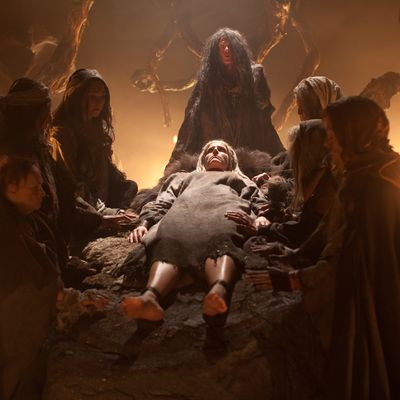
The best way to experience Rob ZombieÔÇÖs The Lords of Salem is as the satanic answer to Terrence MalickÔÇÖs To the Wonder. ItÔÇÖs To the Horror. The inverse parallels are striking. Both directors evince only the most casual interest in narrative. Both gesture toward Catholic iconography ÔÇö Malick to transcend it; Zombie to defile it. Both view human life largely in terms of its spiritual underpinnings. Malick moves toward the holy light, Zombie ÔÇö as befits his nom dÔÇÖenfer ÔÇö the unholy darkness.
ZombieÔÇÖs wife, Sheri Moon Zombie, is the protagonist, Heidi Hawthorne, and, under a curtain of dreadlocks and behind big glasses, sheÔÇÖs almost as abstracted as Ben Affleck in To the Wonder. Heidi is an ex-drug-addict turned radio co-host on a combination music-and-gab show with Whitey (Jeffrey Daniel Phillips), her hairy sometime-boyfriend, and Herman (Ken Foree, a Zombie regular known to genre fans for George RomeroÔÇÖs Dawn of the Dead). HeidiÔÇÖs last name tells you much about her Massachusetts roots ÔÇö and her connection to a witch hunter seen in the movieÔÇÖs orgiastic prologue (naked middle-aged witches, drawn-out immolations). Yes, the Salem witches are real and not the projection of fanatical Puritans. And theyÔÇÖre baaaaack.
The movie has a gritty seventiesÔÇÖ scare-picture vibe, reinforced by its sacrilegious centerpiece, a vinyl record delivered to Heidi at her station. It has one long song credited to ÔÇ£the Lords,ÔÇØ with a couple of minor chord progressions amid an infernal drone. Played on the radio, it has a hypnotic impact not just on Heidi but several female listeners around the town. Author Francis Matthias (Bruce Davison) ÔÇö hitherto a skeptic ÔÇö takes an interest in the record and pokes around in the historical archives. While he investigates, Heidi has bad dreams.
TheyÔÇÖre some bad dreams, featuring, among other things, a disembowelment, the birth and (presumed offscreen) killing of a too-angelic baby, and the requisite goats. Piet├ás are blasphemously front and center. Zombie, n├®e Robert Bartleh Cummings, founded the horror-tinged heavy-metal band White Zombie and thinks in terms of grandiosely grisly production numbers. Vile ceremonies unfold in a plush theater to the reverberant strains of a Bach cantata and MozartÔÇÖs Requiem. Again and again, Heidi awakens from dreams we take for real with a start ÔÇö an annoying scare-movie trope but semi-defensible here. ItÔÇÖs all real in a hellish alternate reality.
The Lords of Salem is gloomy, lacks variety, and is not without its flat patches. Heidi is an increasingly dullish heroine, and in the first 15 minutes youÔÇÖll know whatÔÇÖs going to happen in the next 80. YouÔÇÖll know whatÔÇÖs going happen ÔÇö but not how itÔÇÖs going to look or sound. ItÔÇÖs always a treat to see Davison, who adds a much-needed dose of amiability ÔÇö no fruity Van Helsing/Dr. Loomis inflections. More of a trip are three older ladies who pop up in HeidiÔÇÖs boarding house ÔÇö clucking hens whose motherliness becomes gradually, unnervingly invasive. Meg Wallace, Patricia (a.k.a. Pat) Quinn, and Dee Wallace have impressive pedigrees and honor their heritage of horror.
One more inverse parallel: I have, in this review, likened Rob Zombie to Terrence Malick, which is ÔÇö in cin├®aste terms ÔÇö as blasphemous as anything in The Lords of Salem. What can I say? The devil made me do it.


